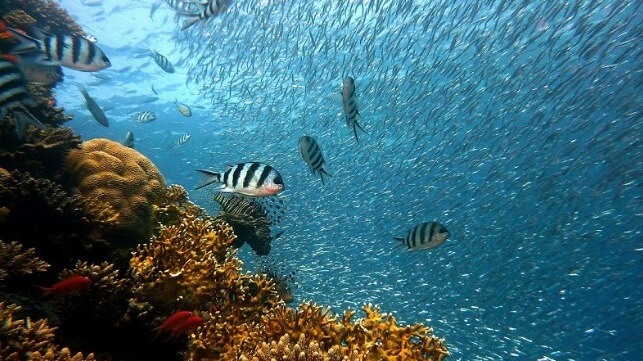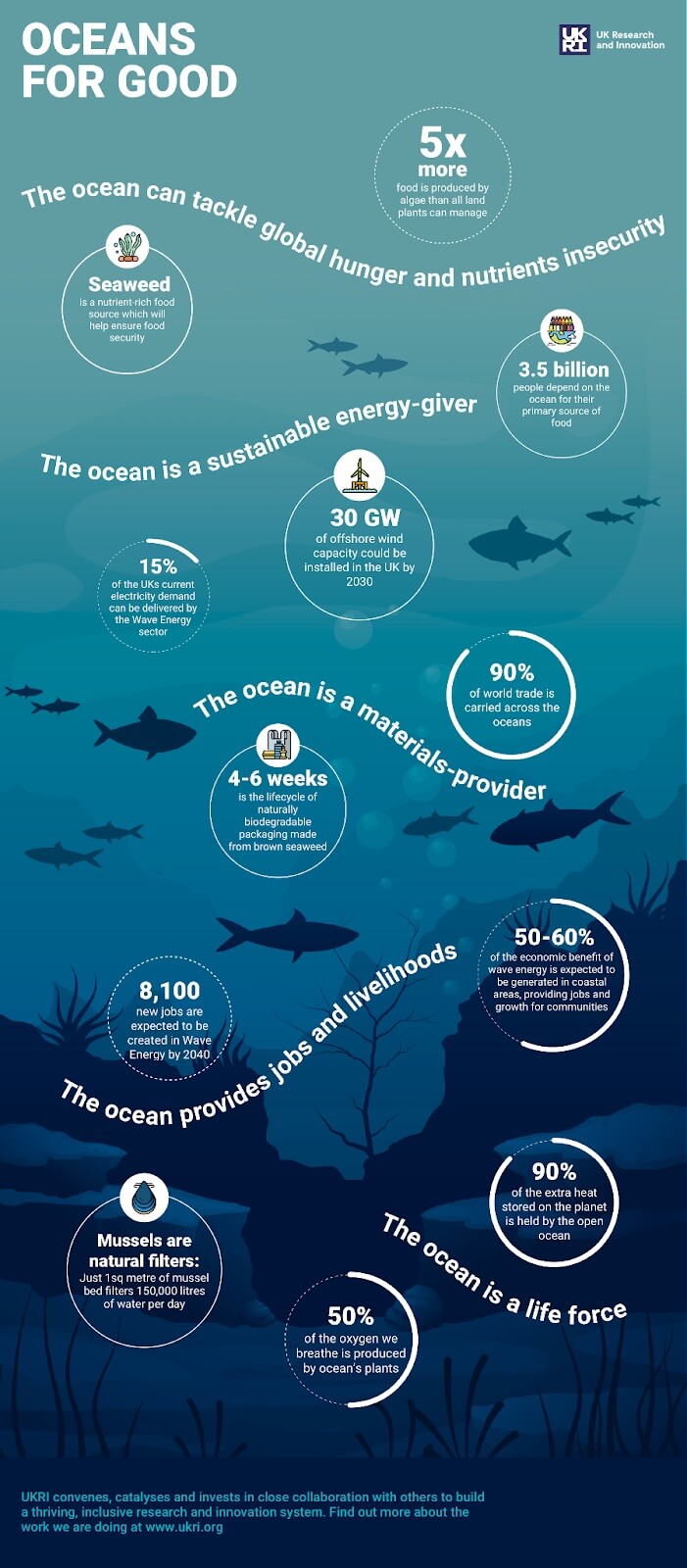Infographic: Oceans for Good

Climate change presents one of the greatest challenges in human history and represents a grave threat to the health of our oceans. The ocean ecosystems that regulate our climate are becoming increasingly threatened by the consequences of human activity, already shown by the rising sea temperatures and ocean acidification. Atmospheric carbon dioxide levels are continually rising, causing dramatic changes in oceanic chemistry and putting marine life in danger.
Thankfully our oceans have the power to create solutions. They are a natural resource that can be harnessed for good, saving humanity from environmental destruction during this period of rapid global warming.
These vast bodies of water play many crucial roles. They provide food security, regulate rainfall patterns on land surfaces, revitalize coastal areas, and are responsible for sequestering carbon dioxide and aiding ocean life in its fight against climate change.
UK Research and Innovation has produced an Oceans For Good infographic for the post-COP26 conversation on climate targets, and it highlights some of the many benefits of our blue planet.

The Healing Power of the Ocean
Our majestic seas are a force for good when it comes to combating the climate crisis. Some of the key statistics UKRI have highlighted include:
- 50 percent of the oxygen we breathe is produced by ocean’s plants
- 4-6 weeks is the lifecycle of natural biodegradable packaging made from brown seaweed
- 90 percent of the extra heat stored on the planet is held by the open ocean
- 3.5 billion people depend on the ocean as their primary source of food
Much of the ocean science data is taken from the Wave Energy Innovation Position Paper, written by the Supergen Offshore Renewable Energy Hub. This Engineering and Physical Sciences Research Council -funded program strives for innovation and development of offshore wind, wave and tidal technology to benefit society.
Other statistics have been derived from the Plymouth Marine Laboratory, a charity that aims to develop and apply innovative marine science for our oceans to be free of plastic waste and sustained into the future.
The Ocean is a Life Force
The oceans have been a great equaliser in the fight against climate change. In just 60 years, they have soaked up 90 percent of man-made greenhouse gas emissions and turned them into harmless molecules that will help keep our planet habitable for future generations. Our oceans also provide an enormous 70 percent of the oxygen on Earth, absorb 50 times more carbon dioxide than the atmosphere and provide a sixth of the protein we eat from fish.
Phytoplankton – tiny plant-like organisms that live in the sea – are responsible for at least 50 percent of the oxygen on Earth.
And in the marine family Mytilidae, bivalve molluscs such as mussels act as natural biofilters, efficiently filtering out particles from seawater. Just one square meter of mussel bed can filter an enormous 150,000 liters of water per day. This immense filtering power can potentially be harnessed to remove microplastic pollution from estuarine and coastal waters; by using beds or "bioreefs" of mussels.
Aquatic Foods against Global Hunger: Reducing Food & Nutrition Insecurity
The abundance of marine plants and algae in our oceans supply more food than all land plants combined, with marine microalgae producing protein, Omega-3 fatty acids and many other nutrients. By eliminating reliance on wild-caught fish as a source of Omega-3, we can harness the potential of microalgae as a sustainable alternative source.
Seaweed is another nutrient-rich aquatic food source that offers an alternative to animal-based sources for sustenance when resources may be scarce. Seaweed can support up to 150 times more protein per acre than crops such as rice. Its bioactive extracts also offer wellness benefits, including gut and microbiome health, anti-inflammation and immune stimulation.
Aquatic foods lead the way in the fight against global hunger. Astonishingly, there are 10-100 times more minerals and vitamins found in a dry unit of seaweed compared to animal-derived foods.
In addition, seaweed has the power to absorb carbon dioxide from our atmosphere, decrease ocean eutrophication and have a positive impact on greenhouse gas emissions when used in cattle feed. Sustainable seaweed can lower a cow's methane production by up to 99 percent.
The opinions expressed herein are the author's and not necessarily those of The Maritime Executive.
